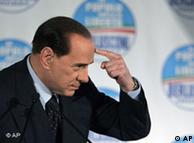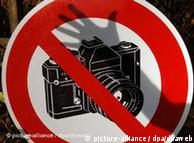Press Freedom | 09.10.2009
Watchdogs say press freedoms increasingly at risk in some EU states
Western Europe continues to boast the world's highest level of press freedom, as documented by annual reports and analysis by rights groups such as Reporters without Borders and Freedom House. However, some European countries have seen an increase in restrictions in press freedoms which suggest that Europe is not immune from the continuing decline in press freedoms around the world.
Despite there being a genuine press freedom within the EU where the media is diverse and free to enjoy a generally assured pluralism of ideas, the situation in Europe is not perfect.
Freedom House states in its annual press freedom report covering 2008 that an overall increase in press restrictions was recorded for the seventh straight year and for the first time every global region experienced a clampdown on press freedoms.
This means that Europe, while still some way behind, increases its presence alongside traditionally authoritarian states in the list of those regions witnessing an erosion of freedom and rights.
Italy leads Europe’s downward slide
 Bildunterschrift: Großansicht des Bildes mit der Bildunterschrift: Berlusconi is accused of wanting to spread his media influence
Bildunterschrift: Großansicht des Bildes mit der Bildunterschrift: Berlusconi is accused of wanting to spread his media influence
Leading this European slide is Italy. In Freedom House's press freedom report, Italy slipped out of the watchdog's Free Press category into the Partly Free category due to practices such as "free speech limited by courts and libel laws, increased intimidation of journalists by organized crime and far-right groups, and concerns over the concentration of media ownership."
Italy's down-grading was the main example Freedom House used to illustrate the worrying trend of established democracies with traditionally open media introducing more restrictions to media freedom.
"Our press freedom survey shows the worst offenders in ‘Old Europe’ as Italy, Greece, and Spain," Arch Puddington, vice president for research at Freedom House, told Deutsche Welle. "Italy is clearly the most problematic of the three. Its problems stem largely from Berlusconi's role as media baron and his policies as prime minister; concentration of media, especially television, that goes well beyond the high degree of concentration one finds in many EU countries, politicization of state owned public service broadcaster Rai (Radio Televisione Italiana); biased coverage in the Berlusconi press; and efforts to muzzle critics through libel action.
Berlusconi is accused of attempting to gag certain quarters of the Italian press by launching a number of lawsuits against those newspapers who continue to pressure him about his private life and allegations of corruption. He has even made attempts to censor international media reports by taking legal action against Spanish and French papers which have covered his extra-curricular activities, and has threatened to sue a number of British newspapers.
Elsewhere, he is accused of using the state-owned media and the media owned by his Mediaset press empire to portray himself and his activities in a flattering light.
"Most European countries, especially those in the EU, refrain from efforts at overt pressure on the press," Puddington added. "But here again, Italy under Berlusconi is the worst offender given his efforts to control his own press and intimidate press that might be critical of his policies or personal behavior."
Reporters without Borders also names Italy as Europe's worst offender. Italian Prime Minister Silvio Berlusconi is on the verge of becoming the first European leader to feature on the watchdog's list of "Predators of Press Freedom" and it expects Italy to come last out of all the EU member countries in its soon-to-be released annual press freedom index.
New Europe offenders threaten EU reputation
 Bildunterschrift: Großansicht des Bildes mit der Bildunterschrift: A number of eastern European countries are still ignoring press freedom lawsPress freedoms in the European nations categorized as ‘New Europe’ generally remain in both watchdog’s Free Press category - but not all EU member states in this group are viewed favourably.
Bildunterschrift: Großansicht des Bildes mit der Bildunterschrift: A number of eastern European countries are still ignoring press freedom lawsPress freedoms in the European nations categorized as ‘New Europe’ generally remain in both watchdog’s Free Press category - but not all EU member states in this group are viewed favourably.
"Two exceptions here are Romania and Bulgaria," said Puddington. "Problems in Romania stem from threats to journalists, especially those covering corruption and organized crime, and from the use of lawsuits to silence critics. Conditions in Bulgaria are similar, with reporters facing death threats and other pressures from political figures and organized crime."
Freedom House and Reporters without Borders had more concerns about the current state of press freedom in those non-EU countries with accession ambitions.
"Among non-EU states, the lowest scores were recorded by Turkey, Albania, and Macedonia," Puddington continued. "Turkey's problems stemmed from a number of aspects, including large number of journalists being prosecuted for violating laws on ‘Turkishness,’ legal action directed against opposition newspapers, and threats against journalists who comment on relations with Armenia, the Kurdish minority, and similar issues."
Croatia, a candidate country for EU accession, was also among those causing concern after reports of journalists being murdered, while Bosnia, a potential EU candidate country, had a number of cases of journalists being assaulted and intimidated.
Despite concerns, Europe still a positive global example
Despite indications that Europe’s reputation as a bastion of press freedom is under threat, most European countries continue to uphold this reputation in the face of a steady, though not extreme, decline in global press freedom over the past seven years.
"Despite the rise in terrorism, the various proposals to restrict press access to official secrets, the temptation to self censor on sensitive issues like immigration and Muslims generally, the press in the EU has maintained an impressive record of media freedom," Arch Puddington concluded. "In this regard, the Italy example is unusual; most EU countries, including the newer members, have very positive records, by global standards."
Author: Nick Amies
Editor: Rob Mudge


No comments:
Post a Comment